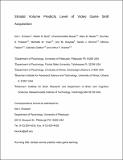Striatal Volume Predicts Level of Video Game Skill Acquisition
Author(s)
Graybiel, Ann M.; Erickson, Kirk I.; Boot, Walter R.; Basak, Chandramallika; Neider, Mark B.; Prakash, Ruchika S.; Voss, Michelle W.; Graybiel, Ann M.; Simons, Daniel J.; Fabiani, Monica; Gratton, Gabriele; Kramer, Arthur F.; ... Show more Show less
DownloadErickson_et_al_2010_Cerebral_Cortex.pdf (944.7Kb)
OPEN_ACCESS_POLICY
Open Access Policy
Creative Commons Attribution-Noncommercial-Share Alike
Terms of use
Metadata
Show full item recordAbstract
Video game skills transfer to other tasks, but individual differences in performance and in learning and transfer rates make it difficult to identify the source of transfer benefits. We asked whether variability in initial acquisition and of improvement in performance on a demanding video game, the Space Fortress game, could be predicted by variations in the pretraining volume of either of 2 key brain regions implicated in learning and memory: the striatum, implicated in procedural learning and cognitive flexibility, and the hippocampus, implicated in declarative memory. We found that hippocampal volumes did not predict learning improvement but that striatal volumes did. Moreover, for the striatum, the volumes of the dorsal striatum predicted improvement in performance but the volumes of the ventral striatum did not. Both ventral and dorsal striatal volumes predicted early acquisition rates. Furthermore, this early-stage correlation between striatal volumes and learning held regardless of the cognitive flexibility demands of the game versions, whereas the predictive power of the dorsal striatal volumes held selectively for performance improvements in a game version emphasizing cognitive flexibility. These findings suggest a neuroanatomical basis for the superiority of training strategies that promote cognitive flexibility and transfer to untrained tasks.
Date issued
2010-11Department
delete; Massachusetts Institute of Technology. Department of Brain and Cognitive Sciences; McGovern Institute for Brain Research at MITJournal
Cerebral Cortex
Publisher
Oxford University Press
Citation
Erickson, Kirk I. et al. “Striatal Volume Predicts Level of Video Game Skill Acquisition.” Cerebral Cortex 20.11 (2010) : 2522 -2530.
Version: Author's final manuscript
ISSN
1047-3211
1460-2199